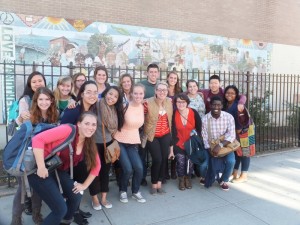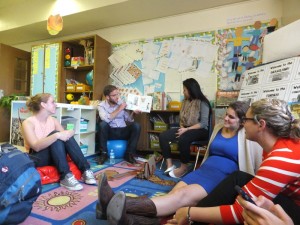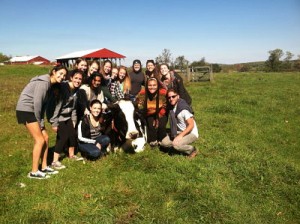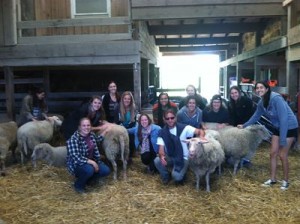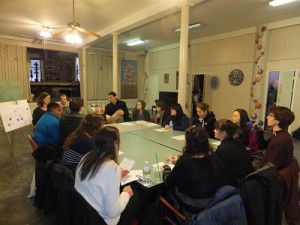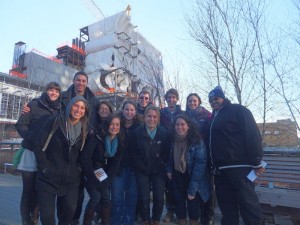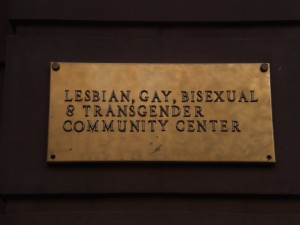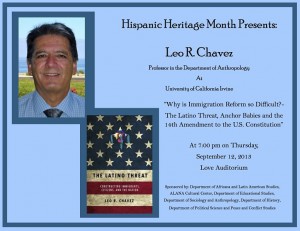Professor Stern’s Politics and Education class (EDUC 310) took a trip to investigate contemporary education policy today by visiting with faculty and students at the Promise Charter Academy. They also visited with Julie Cavanagh and other faculty and students at Patrick F. Daly school (P.S. 15) in Red Hook, Brooklyn. Julie Cavanagh, a teacher-activist and member of the Movement of Rank and File Educators, will be coming to give a keynote at the NYSFEA Conference hosted at Colgate University on February 28th.
Latest Posts
Politics in Education class visits The Harlem Children’s Zone and P.S. 15 in Red Hook, Brooklyn
By Grace Western on February 11, 2014Education for Peace and Nonviolence visits The Farm Sanctuary in Watkins Glen, NY
By Grace Western on February 11, 2014Prof. Stern’s Education for Peace and Nonviolence (EDUC 210) class visited The Farm Sanctuary in Watkins Glen, NY to learn more about factory farming and the treatment of animals.
Education 210 at The Farm Sanctuary
Queering Education Class Trip to New York City
By Grace Western on February 11, 2014Prof. Stern’s Queering Education class (EDUC/LGBT 241) went on a Beyond Colgate funded trip for two days to New York to visit people from The Lesbian, Gay, Bisexual, & Transgender Community Center, The Harvey Milk High School, the Trinity Place Shelter, NYQueer, and to see a performance of The Laramie Project at the Brooklyn Academy of Music.
Department of Educational Studies to Host 43rd Annual New York Foundations of Education Association Conference
By Grace Western on February 10, 2014The Department of Educational Studies is thrilled to be hosting the New York State Foundations of Education Association (NYSFEA) and would like to personally invite you to participate in our annual conference, “Teachers and Teacher Educators Talking Back: Reclaiming the Public in Public Education,” to be held at Colgate University in Hamilton, NY. The conference begins Friday evening, February 28 and will continue thru Saturday, March 1, 2014. K-12 teachers will be our guests for a lively Friday dinner at The Good Nature Brewery on Broad St. in Hamilton, and Saturday lunch at the conference on campus at Colgate. All information can be found at the conference website:http://nysfeaconference2014.tumblr.com/
Please direct any questions to Mark Stern (mstern@colgate.edu) or Barbara Regenspan (bregenspan@colgate.edu).
Please RSVP at our Doodle Poll: http://doodle.com/sresm95p6u6ixebf
Department of Educational Studies Hosts Dr. K. Wayne Yang for the 12th Annual Race and Education Lecture
By Grace Western on February 10, 2014
Wayne Yang will speak at Colgate on March 25, 2014.
Please join us on Tuesday, March 25 at 7pm in Love Auditorium for a talk by Dr. K. Wayne Yang entitled: “A Ghost in the University Machine: A Methodology of Organizing.”
Within the colonizing university also exists a decolonizing education. That is, occupying the same space and time are the colonizer’s territories and institutions and colonized time, but also Indigenous land and life before and beyond occupation. In this respect, paraphrasing the words of Linda Tuhiwai Smith, the present of school is permeable to the time now (colonization), the time before that (pre-colonial), and the time beyond of all of that (postcolonial).
To assemble a decolonizing machinery out of the university requires a special mode of organizing, a peculiar type of agency, or more precisely, a peculiar agent of organizing. The scyborg, this agent of change, is the ghost in the machine, rewiring machinery to decolonial intentions. This talk will explore the university’s settler colonial role, as produced not only upon land but from land, and its desires for colonizer (and paradoxically Indigenous) futures. This talk will also conjure the methodologies of the scyborg, this queer gear, the lopsided bot, that makes the machine work (for freedom sometimes) by helping the machine (of unfreedom) break down.
K. Wayne Yang is an assistant professor in Ethnic Studies at the University of California, San Diego. His work transgresses the line between scholarship and community, as evidenced by his involvement in urban education and community organizing. He was a public school teacher in Oakland, California, for over 15 years, and also served in the Office of School Reform within the Superintendent’s cabinet. He co-founded the Avenues Project, a youth development non-profit organization, as well as East Oakland Community High School, which were inspired by the Survival Programs of the Black Panther Party. Currently, he is collaborating with Roses In Concrete to create a K-12 school center in Oakland.
His research interests include: ghetto colonialism, decolonization, popular culture and social movements. With his frequent collaborator, Eve Tuck, he wrote, “Decolonization is not a metaphor” (2012) which is one of their most widely read articles. Youth Resistance Research and Theories of Change (2014), is their most recent collaboration – an edited book examining a range of topics from foundational theories of resistance to contemporary studies of the DREAMer movement, the bodily resistance of LGBTQ street youth, urban Native youth resistance, the decolonial struggles of Palestinian diasporic youth, and STEM institutions for collective Black resistance.
Currently, he is writing a book on community organizing, and revising a draft of “A third university is possible,” an essay about scyborgs and decolonizing machines.
Prof. Anna Rios and Department of Educational Studies host UC Irvine Scholar Dr. Leo Chavez for Hispanic Heritage Month Lecture
By Grace Western on February 10, 2014Prof. Chavez’s talk was based on his newest book, The Latino Threat: Constructing Immigrants, Citizens, and the Nation (2008: Standford Univ. Press), which argues that the ways in which immigration is talked about has implications for public policy and the public imaginary.
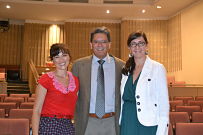
Colgate Faculty with Professor Chavez


